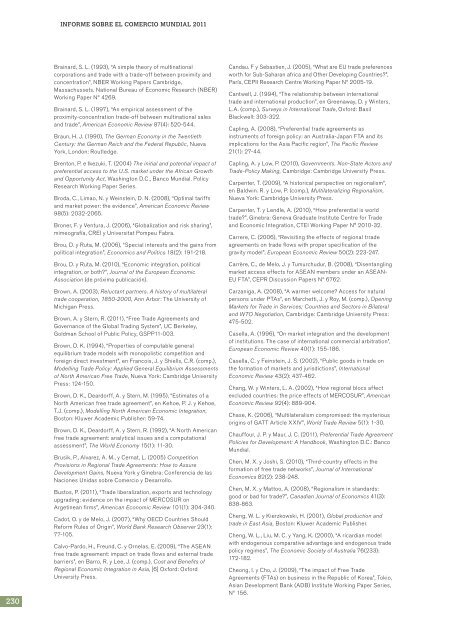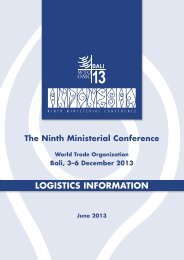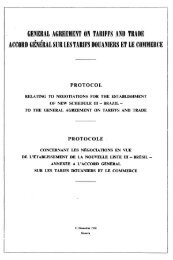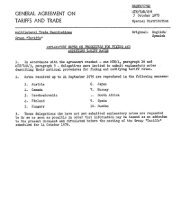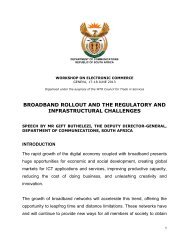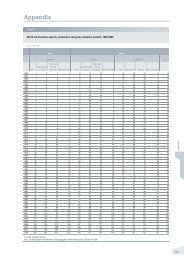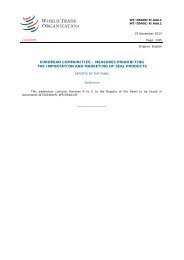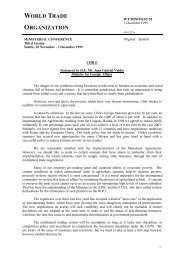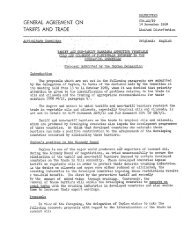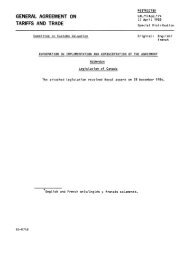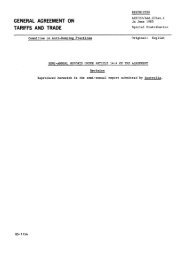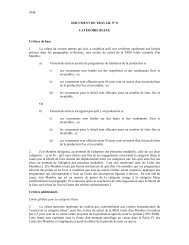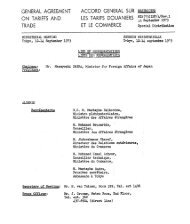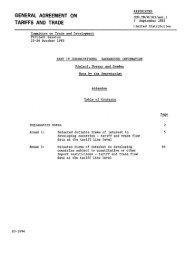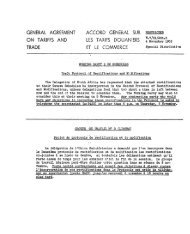el Comercio Informe sobre Mundial 2011
el Comercio Informe sobre Mundial 2011
el Comercio Informe sobre Mundial 2011
Create successful ePaper yourself
Turn your PDF publications into a flip-book with our unique Google optimized e-Paper software.
230<br />
InfOrME sObrE EL COMErCIO MundIaL <strong>2011</strong><br />
Brainard, S. L. (1993), “A simple theory of multinational<br />
corporations and trade with a trade-off between proximity and<br />
concentration”, NBER Working Papers Cambridge,<br />
Massachussets. National Bureau of Economic Research (NBER)<br />
Working Paper Nº 4269.<br />
Brainard, S. L. (1997), “An empirical assessment of the<br />
proximity-concentration trade-off between multinational sales<br />
and trade”, American Economic Review 87(4): 520-544.<br />
Braun, H. J. (1990), The German Economy in the Twentieth<br />
Century: the German Reich and the Federal Republic, Nueva<br />
York, London: Routledge.<br />
Brenton, P. e Ikezuki, T. (2004) The initial and potential impact of<br />
preferential access to the U.S. market under the African Growth<br />
and Opportunity Act, Washington D.C., Banco <strong>Mundial</strong>. Policy<br />
Research Working Paper Series.<br />
Broda, C., Limao, N. y Weinstein, D. N. (2008), “Optimal tariffs<br />
and market power: the evidence”, American Economic Review<br />
98(5): 2032-2065.<br />
Broner, F. y Ventura, J. (2006), “Globalization and risk sharing”,<br />
mimeografía, CREI y Universitat Pompeu Fabra.<br />
Brou, D. y Ruta, M. (2006), “Special interests and the gains from<br />
political integration”, Economics and Politics 18(2): 191-218.<br />
Brou, D. y Ruta, M. (2010), “Economic integration, political<br />
integration, or both?”, Journal of the European Economic<br />
Association (de próxima publicación).<br />
Brown, A. (2003), R<strong>el</strong>uctant partners. A history of multilateral<br />
trade cooperation, 1850-2000, Ann Arbor: The University of<br />
Michigan Press.<br />
Brown, A. y Stern, R. (<strong>2011</strong>), “Free Trade Agreements and<br />
Governance of the Global Trading System”, UC Berk<strong>el</strong>ey,<br />
Goldman School of Public Policy, GSPP11-003.<br />
Brown, D. K. (1994), “Properties of computable general<br />
equilibrium trade mod<strong>el</strong>s with monopolistic competition and<br />
foreign direct investment”, en Francois, J. y Shi<strong>el</strong>ls, C.R. (comp.),<br />
Mod<strong>el</strong>ling Trade Policy: Applied General Equilibrium Assessments<br />
of North American Free Trade, Nueva York: Cambridge University<br />
Press: 124-150.<br />
Brown, D. K., Deardorff, A. y Stern, M. (1995), “Estimates of a<br />
North American free trade agreement”, en Kehoe, P. J. y Kehoe,<br />
T.J. (comp.), Mod<strong>el</strong>ling North American Economic Integration,<br />
Boston: Kluwer Academic Publisher: 59-74.<br />
Brown, D. K., Deardorff, A. y Stern, R. (1992), “A North American<br />
free trade agreement: analytical issues and a computational<br />
assessment”, The World Economy 15(1): 11-30.<br />
Brusik, P., Alvarez, A. M., y Cernat, L. (2005) Competition<br />
Provisions in Regional Trade Agreements: How to Assure<br />
Dev<strong>el</strong>opment Gains, Nueva York y Ginebra: Conferencia de las<br />
Naciones Unidas <strong>sobre</strong> <strong>Comercio</strong> y Desarrollo.<br />
Bustos, P. (<strong>2011</strong>), “Trade liberalization, exports and technology<br />
upgrading: evidence on the impact of MERCOSUR on<br />
Argetinean firms”, American Economic Review 101(1): 304-340.<br />
Cadot, O. y de M<strong>el</strong>o, J. (2007), “Why OECD Countries Should<br />
Reform Rules of Origin”, World Bank Research Observer 23(1):<br />
77-105.<br />
Calvo-Pardo, H., Freund, C. y Orn<strong>el</strong>as, E. (2009), “The ASEAN<br />
free trade agreement: impact on trade flows and external trade<br />
barriers”, en Barro, R. y Lee, J. (comp.), Cost and Benefits of<br />
Regional Economic Integration in Asia, [6] Oxford: Oxford<br />
University Press.<br />
Candau. F y Sebastien, J. (2005), “What are EU trade preferences<br />
worth for Sub-Saharan africa and Other Dev<strong>el</strong>oping Countries?”,<br />
París, CEPII Research Centre Working Paper Nº 2005-19.<br />
Cantw<strong>el</strong>l, J. (1994), “The r<strong>el</strong>ationship between international<br />
trade and international production”, en Greenaway, D. y Winters,<br />
L.A. (comp.), Surveys in International Trade, Oxford: Basil<br />
Blackw<strong>el</strong>l: 303-322.<br />
Capling, A. (2008), “Preferential trade agreements as<br />
instruments of foreign policy: an Australia-Japan FTA and its<br />
implications for the Asia Pacific region”, The Pacific Review<br />
21(1): 27-44.<br />
Capling, A. y Low, P. (2010), Governments. Non-State Actors and<br />
Trade-Policy Making, Cambridge: Cambridge University Press.<br />
Carpenter, T. (2009), “A historical perspective on regionalism”,<br />
en Baldwin. R. y Low, P. (comp.), Multilateralizing Regionalism,<br />
Nueva York: Cambridge University Press.<br />
Carpenter, T. y Lendle, A. (2010), “How preferential is world<br />
trade?”, Ginebra: Geneva Graduate Institute Centre for Trade<br />
and Economic Integration, CTEI Working Paper N° 2010-32.<br />
Carrere, C. (2006), “Revisiting the effects of regional trrade<br />
agreements on trade flows with proper specification of the<br />
gravity mod<strong>el</strong>”, European Economic Review 50(2): 223-247.<br />
Carrère, C., de M<strong>el</strong>o, J. y Tumurchudur, B. (2008), “Disentangling<br />
market access effects for ASEAN members under an ASEAN-<br />
EU FTA”, CEPR Discussion Papers Nº 6762.<br />
Carzaniga, A. (2008), “A warmer w<strong>el</strong>come? Access for natural<br />
persons under PTAs”, en Marchetti, J. y Roy, M. (comp.), Opening<br />
Markets for Trade in Services; Countries and Sectors in Bilateral<br />
and WTO Negotiation, Cambridge: Cambridge University Press:<br />
475-502.<br />
Cas<strong>el</strong>la, A. (1996), “On market integration and the dev<strong>el</strong>opment<br />
of institutions. The case of international commercial arbitration”,<br />
European Economic Review 40(1): 155-186.<br />
Cas<strong>el</strong>la, C. y Feinstein, J. S. (2002), “Public goods in trade on<br />
the formation of markets and jurisdictions”, International<br />
Economic Review 43(2): 437-462.<br />
Chang, W. y Winters, L. A. (2002), “How regional blocs affect<br />
excluded countries: the price effects of MERCOSUR”, American<br />
Economic Review 92(4): 889-904.<br />
Chase, K. (2006), “Multilateralism compromised: the mysterious<br />
origins of GATT Article XXIV”, World Trade Review 5(1): 1-30.<br />
Chauffour, J. P. y Maur, J. C. (<strong>2011</strong>), Preferential Trade Agreement<br />
Policies for Dev<strong>el</strong>opment: A Handbook, Washington D.C.: Banco<br />
<strong>Mundial</strong>.<br />
Chen, M. X. y Joshi, S. (2010), “Third-country effects in the<br />
formation of free trade networks”, Journal of International<br />
Economics 82(2): 238-248.<br />
Chen, M. X. y Mattoo, A. (2008), “Regionalism in standards:<br />
good or bad for trade?”, Canadian Journal of Economics 41(3):<br />
838-863.<br />
Cheng, W. L. y Kierzkowski, H. (2001), Global production and<br />
trade in East Asia, Boston: Kluwer Academic Publisher.<br />
Cheng, W. L., Liu, M. C. y Yang, K. (2000), “A ricardian mod<strong>el</strong><br />
with endogenous comparative advantage and endogenous trade<br />
policy regimes”, The Economic Society of Australia 76(233):<br />
172-182.<br />
Cheong, I. y Cho, J. (2009), “The impact of Free Trade<br />
Agreements (FTAs) on business in the Republic of Korea”, Tokio,<br />
Asian Dev<strong>el</strong>opment Bank (ADB) Institute Working Paper Series,<br />
Nº 156.


